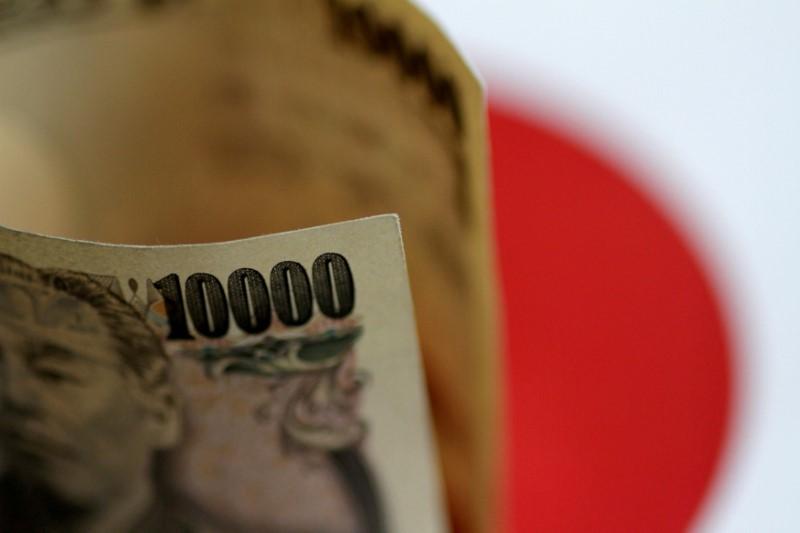
TOKYO (Reuters) – The yen surged against the dollar on Friday after Bank of Japan Haruhiko Kuroda said the central bank will consider an exit from its ultra easy monetary policy if its inflation target is achieved in the year ending in March 2020.
Speculation regarding when the BOJ, which has significantly lagged its peers in moving towards policy normalisation, would explore an exit from easy policy has been one of the key themes impacting the yen, adding to global policy uncertainty.
Some in the currency market had suspected the BOJ was quietly moving towards a policy exit, despite its reiterations that it would stick to easing. And while the BOJ may not end easing right away, investors received the clearest indication yet as to when the central bank intends to begin stepping away from unorthodox policies.
“Kuroda’s comments come at a time when the BOJ’s actions were already being viewed with caution after it recently trimmed the amount of Japanese government bonds it bought,” said Daisuke Karakama, senior market economist at Mizuho Bank in Tokyo.
The BOJ on Wednesday raised eyebrows after it reduced the amount of 25- to 40-year JGBs it purchased at a regular debt-buying operation to 70 billion yen ($662.25 million) from 80 billion yen.
“And if his comments are to be taken at face value, it spells a major turning point in BOJ policy. The dollar could have a difficult time staying above 105 yen as the European and North American markets enter the day,” Karakama at Mizuho Bank said.
The greenback was 0.35 percent lower at 105.865 yen after touching 105.710, its lowest since Feb. 16.
The dollar was already on the backfoot even before BOJ’s Kuroda spoke, having pulled sharply back from six-week highs after U.S. President Donald Trump’s decision to impose tariffs on steel and aluminium took the wind out of the greenback’s week-long recovery.
The dollar index against a basket of six major currencies fell 0.1 percent to 90.223.
The index had already shed 0.4 percent overnight, peeled away from a high of 90.932 – its strongest since Jan. 19 – after Trump announced on Thursday he would impose steep tariffs on imported steel and aluminium.
The Trump administration said the tariffs would protect U.S. industry, but the dollar and Wall Street shares slumped as the plan sparked fears of an imminent trade war and worries about its potentially negative impact on the world’s largest economy.
“Simply put, both the U.S. consumer and corporate sectors are seen losing out from the tariffs, and that is the logic hurting the dollar,” said Masashi Murata, senior currency strategist at Brown Brothers Harriman in Tokyo.
“Corporations will have to raise prices due to the tariffs and pass the cost onto the consumers,” Murata said.
While U.S. steel and aluminium manufacturers could benefit from higher prices, corporations that have to purchase the metals are expected to suffer.
Prior to Trump’s announcement, the dollar had enjoyed a rebound from three-year lows plumbed mid-February as hawkish-sounding comments by new Federal Reserve Chair Jerome Powell sharpened expectations towards the central bank raising rates as much as four times this year.
The dollar had sank to the three-year low last month, partly on fears of U.S. protectionism, and such worries were revived just as the currency looked set to shake off weakness suffered through much of February.
“The dollar appeared oversold in February, with the number of currency bears having increased beyond excess. Prior to Trump’s tariff talk some of that excess was being corrected, but his announcement took the dollar back to square one,” said Yukio Ishizuki, senior currency strategist at Daiwa Securities in Tokyo.
The euro was flat at $1.2265 after rising 0.6 percent overnight.
The common currency was still poised for a loss of about 0.25 percent this week, during which it slid to a seven-week low of $1.2154 on Thursday when the dollar was still enjoying a broad bounce.
Focus for the euro was on the Italian parliamentary election scheduled on Sunday and how much support populist agendas could garner due to its potential impact on the European Union.
Leading political parties in Germany also decide on a coalition deal on Sunday that would secure Angela Merkel a fourth term as chancellor.
The pound was effectively flat at $1.3777 after bouncing overnight from a near two-month low of $1.3712.
British Prime Minister Theresa May will lay out her views on how to keep trade open between all of the United Kingdom and the European Union in a key speech on Friday.
 0 comments
0 comments





